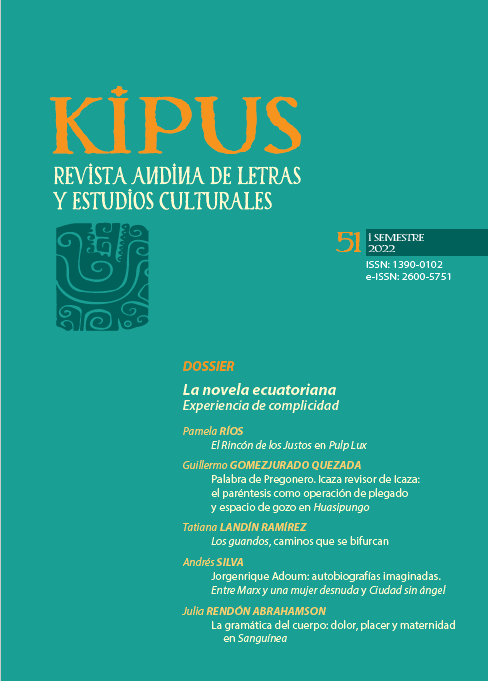Sanguínea de Gabriela Ponce o la risa de la carne
Contenido principal del artículo
Resumen
A la luz del nomadismo de Rosi Braidotti y del grotesco estudiado por Bajtín, se pretende abrir una vía para pensar afirmativamente el cuerpo en la literatura. Luego de analizar los mitos de caída a través de la antropología de Ricoeur, se observan las imágenes del hueco en Sanguínea (2019) de Gabriela Ponce para proponer a este como una figuración del cuerpo, es decir, la carne como hueco que desfundamenta los discursos normativos del cuerpo. A través de esta figuración se propone una conexión entre la escritura del cuerpo y el desarrollo del grotesco renacentista. En esta conexión se encuentra la risa necesaria para escribir sobre la carne, una risa desestabilizadora del reino del Sujeto como Mismidad (universal, masculino,
blanco, heterosexual, racional).
##plugins.themes.bootstrap3.displayStats.downloads##
Detalles del artículo
Sección

Esta obra está bajo una licencia internacional Creative Commons Atribución-NoComercial-CompartirIgual 4.0.
Cómo citar
Referencias
Acker, Kathy. 1995. “The End of the World of White Men”. En Posthuman bodies, editado por Ira Livingston y Judith Halberstam, 57-72. Indiana: University Press.
Adams, Carol, y Josephine Donovan. 1995. Animals & Women: Feminist theoretical explorations. Durham / Londres: Duke University Press.
Balladares, María. 2020. “Las listas y la escritura del desastre en Sanguínea, de Gabriela Ponce Padilla”. Kipus, 48: 157-68. https://doi.org/10.32719/13900102.2020.48.10.
Bajtín, Mijaíl. 2003. La cultura popular en la Edad Media y en el Renacimiento: el contexto de Françoise Rabelais. Madrid: Alianza.
Bloom, Harold, ed. 2009. The Grotesque. Nueva York: Bloom’s literary criticism.
Braidotti, Rosi. 1991. Patterns of Dissonance. Cambridge: Polity Press.
–––. 2000. Sujetos nómades. Buenos Aires: Paidós.
–––. 2005. Metamorfosis: hacia una teoría materialista del devenir. Madrid: Akal.
Bustamante, Mateo. 2020. “La máquina simuladora: acercamientos a Leonardo Valencia”. Pie de página 1, 5: 133-64. http://piedepagina.uartes.edu.ec/wp-content/uploads/sites/9/2020/12/PiePag5-IIsem-15Dic-pags1a1.pdf.
Cixous, Helene. 1995. La risa de la medusa: ensayo sobre la escritura. Barcelona: Anthropos.
Clark, John R. 1991. The modern satiric grotesque and its traditions. Lexington: The University Press of Kentucky.
Creed, Barbara. 2007. The Monstrous Feminine: Film, Feminism, Psychoanalysis. Nueva York: Routledge.
Cronenberg, David. 1983. Videodrome. Orlando: Universal Pictures. DVD.
Deleuze, Gilles. 2011. Lógica del sentido. Madrid: Paidós.
–––. 2016. Nietzsche y la filosofía. Barcelona: Anagrama.
–––. 2017. Diferencia y repetición. Buenos Aires: Amorrortu.
–––. 2021. Proust y los signos. Barcelona: Anagrama.
–––, y Félix Guattari. 1990. Kafka: por una literatura menor. Ciudad de México: Era. Frazer, James George. 1993. El folklore en el Antiguo Testamento. Madrid: Fondo de Cultura Económica.
Garramuño, Florencia. 2009. La experiencia opaca: literatura y desencanto. Buenos Aires: Fondo de Cultura Económica.
Hekman, Susan. 1991. “Reconstituting the Subject: Feminism, Modernism, and Postmodernism”. Hypatia 6 (2): 44-63. https://www.jstor.org/stable/3810095.
Hennefeld, Maggie, y Nicholas Sammond, eds. 2020. Abjection Incorporated: Mediating the Politics of Pleasure and Violence. Durham: Duke University Press.
Katkus, Laurynas, ed. 2013. Grotesque Revisited: Grotesque and Satire in the Post/Modern Literature of Central and Eastern Europe. Londres: Cambridge Scholars Publishing.
Kristeva, Julia. 2000. Los poderes de la perversión. Ciudad de México: Siglo XXI Editores.
McGibbon, D. D. 1964. “The Fall of the Soul in Plato’s Phaedrus”. The Classical Quarterly 14 (1): 56-63. https://www.jstor.org/stable/637629.
Muckelbauer, John. 2001. “Sophistic Travel: Inheriting the Simulacrum through Plato’s ‘The Sophist’ ”. Philosophy & Rhetoric 34 (3): 225-44. https://www.jstor.org/stable/40238093.
Niebylski, Dianna. 2004. Humoring Resistance: Laughter and the Excessive Body in Contemporary Latin American Women’s Fiction. Nueva York: State University of New York Press.
Perfetti, Lisa. 2003. Women and Laughter in Medieval Comic Literature. Michigan: The University of Michigan Press.
Ponce, Gabriela. 2019. Sanguínea. Quito: Severo.
Ricoeur, Paul. 2004. Finitud y culpabilidad. Madrid: Trotta.
Russo, Mary. 1995. The Female Grotesque: Risk, Excess and Modernity. Nueva York / Londres: Routledge.


